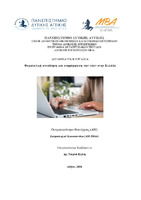| dc.contributor.advisor | Τουρνά-Γερμανού, Ελένη | |
| dc.contributor.author | Ζουμπουρλού, Κωνσταντίνα | |
| dc.date.accessioned | 2024-04-23T12:47:47Z | |
| dc.date.available | 2024-04-23T12:47:47Z | |
| dc.date.issued | 2024-04-01 | |
| dc.identifier.uri | https://polynoe.lib.uniwa.gr/xmlui/handle/11400/6585 | |
| dc.identifier.uri | http://dx.doi.org/10.26265/polynoe-6421 | |
| dc.description.abstract | Η παρούσα διπλωματική εργασία ασχολείται με τη φορολογική ηθική των νέων Ελλήνων σήμερα. Η φορολογική συνείδηση αφορά την αντίληψη των πολιτών για τη σημασία της φορολογίας. Όμως, η συνείδηση των νέων επηρεάζεται από πολλούς παράγοντες, οι οποίοι σχετίζονται με τα δημογραφικά τους στοιχεία. Επίσης, οι κοινωνικοί παράγοντες παίζουν σημαντικό ρόλο στη διασφάλιση της οικονομικής σταθερότητας. Στη συνέχεια, αναλύονται οι όροι της φοροδιαφυγής, της φοροαποφυγής και της παραοικονομίας, εξετάζοντας τα κοινά τους σημεία και τις διαφορές μεταξύ τους. Τέλος, στην παρούσα έρευνα μελετάται η φορολογική συνείδηση των νέων Ελλήνων και τα αποτελέσματα δείχνουν ότι η φορολογική ηθική είναι περίπλοκη. Δείχνουν επίσης πόσο σημαντικό είναι να βελτιωθεί η φορολογική εκπαίδευση και να αυξηθεί η γνώση για τα προβλήματα φοροδιαφυγής στην Ελλάδα. Σύμφωνα με τη μελέτη, οι απόψεις των νέων για τους φόρους επηρεάζονται σε μεγάλο βαθμό από τις οικογένειές τους, το σχολείο, τα μέσα ενημέρωσης, τις ανεπίσημες συναλλαγές, το πόσο περίπλοκο πιστεύουν ότι είναι το φορολογικό σύστημα, το πόσο δίκαιο πιστεύουν ότι είναι το φορολογικό βάρος, οι υποψίες τους για διαφθορά και πιθανός ρόλος της φορολογικής εκπαίδευσης στα σχολεία. Κλείνοντας, στην παρούσα έρευνα συμμετείχαν εκατόν επτα νέοι Έλληνες ηλικίας από 18 εώς 37 ετών. | el |
| dc.format.extent | 129 | el |
| dc.language.iso | el | el |
| dc.publisher | Πανεπιστήμιο Δυτικής Αττικής | el |
| dc.rights | Αναφορά Δημιουργού - Μη Εμπορική Χρήση - Παρόμοια Διανομή 4.0 Διεθνές | * |
| dc.rights | Attribution-NonCommercial-NoDerivatives 4.0 Διεθνές | * |
| dc.rights | Attribution-NonCommercial-NoDerivatives 4.0 Διεθνές | * |
| dc.rights.uri | http://creativecommons.org/licenses/by-nc-nd/4.0/ | * |
| dc.subject | Φορολογική συμμόρφωση | el |
| dc.subject | Φορολογική ηθική | el |
| dc.subject | Φοροδιαφυγή | el |
| dc.subject | Φοροαποφυγή | el |
| dc.subject | Παραοικονομία | el |
| dc.subject | Νέοι | el |
| dc.subject | Ελλάδα | el |
| dc.title | Φορολογική συνείδηση και συμμόρφωση των νέων στην Ελλάδα | el |
| dc.title.alternative | The tax awareness and compliance of young people in Greece | el |
| dc.type | Μεταπτυχιακή διπλωματική εργασία | el |
| dc.contributor.committee | Ασωνίτου, Σοφία | |
| dc.contributor.committee | Gikas, Grigorios | |
| dc.contributor.faculty | Σχολή Διοικητικών, Οικονομικών & Κοινωνικών Επιστημών | el |
| dc.contributor.department | Τμήμα Διοίκησης Επιχειρήσεων | el |
| dc.contributor.master | Διοίκηση Επιχειρήσεων - Master in Business Administration (MBA) | el |
| dc.description.abstracttranslated | This thesis deals with the tax ethics of young Greeks today. Tax consciousness refers to citizens' perception of the importance of taxation. However, young people's consciousness is influenced by many factors, which are related to their demographics.
Social factors also play an important role in ensuring economic stability. In the following, the terms tax evasion, tax avoidance and the informal economy are analysed, examining their commonalities and the differences between them. Finally, this research
studies the tax awareness of young Greeks and the results show that tax ethics is complex. They also show how important it is to improve tax education and increase knowledge about the problems of tax evasion in Greece. According to the study, young
people's views on taxes are heavily influenced by their families, school, the media, informal transactions, how complicated they think the tax system is, how fair they think the tax burden is, their suspicions of corruption and the possible role of tax education
in schools. In conclusion, one hundred and seven young Greeks aged between 18 and 37 participated in the survey. | el |


